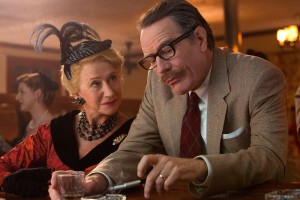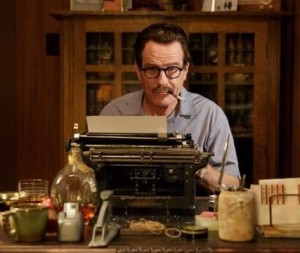
In case you’ve never heard of him, Dalton Trumbo is the famous screenwriter who wrote Spartacus (1960), Exodus (1960) and Papillon (1973). He also won two Oscars for writing Roman Holiday (1953) and The Brave One (1956) – but wasn’t credited with them until many years later. Trumbo tells the story of the blacklisted writer. While it has a lighter touch than expected and feels a little glossy for a biopic with such a serious subject, it’s still an enjoyable journey thanks to standout work from the excellent cast.
 The story follows Trumbo (Bryan Cranston) and his trials with the House of Un-American Activities Committee. A member of the Communist Party, Trumbo’s views came under attack following the onset of the Cold War. Accused of being a threat to traditional values by conservative Hollywood gossip columnist Hedda Hopper (Helen Mirren), the writer’s life is turned upside down. Among the many misdeeds, the man is threatened and shunned by both co-workers and friends. It gets significantly worse when he’s thrown in jail and blacklisted from working, leaving his family in dire financial straits.
The story follows Trumbo (Bryan Cranston) and his trials with the House of Un-American Activities Committee. A member of the Communist Party, Trumbo’s views came under attack following the onset of the Cold War. Accused of being a threat to traditional values by conservative Hollywood gossip columnist Hedda Hopper (Helen Mirren), the writer’s life is turned upside down. Among the many misdeeds, the man is threatened and shunned by both co-workers and friends. It gets significantly worse when he’s thrown in jail and blacklisted from working, leaving his family in dire financial straits.
There’s a lot of dramatic meat to the real-life subject and Cranston does an excellent service to the man. He presents Trumbo as a likable guy with altruistic values, attempting to hold on to his principles in the face of great adversity. As he struggles to keep working and stress arises within the family, one can see the cracks and desperation begin to appear. His relationship with daughter Niki (Elle Fanning) is particularly strong and offers some humanistic insight. The same is true of a strained relationship with actor Edward G. Robinson (Michael Stuhlbarg), who throws the writer under the bus in front of the committee to maintain his career.
This all sounds very heavy and there are somber moments, but most surprising is the sense of humor amidst the despair. Director Jay Roach (the Austin Powers series, Meet the Parents) has a background in comedy and he emphasizes it. There’s a lot of amusing banter about the general absurdity of the situation. And after he is blacklisted, there are really funny scenes involving Trumbo and a pair of B-movie producers (played by John Goodman and Stephen Root) who hire the main character and some of his friends to work for them anonymously.
 Instead of playing these situation as bleak, there are also gags detailing the exasperation of Trumbo’s writer pals Ian Hunter (Alan Tudyk) and Arlen Hird (Louis C.K.). Specifically, with their frustration at being forced to write “gorilla” pictures instead of those with more social significance. The filmmaker also has a lot of fun introducing famous Hollywood celebrities into the story, including Kirk Douglas (Dean O’Gorman), director Otto Preminger (Christian Berkel) and a somewhat dim John Wayne (David James Elliott).
Instead of playing these situation as bleak, there are also gags detailing the exasperation of Trumbo’s writer pals Ian Hunter (Alan Tudyk) and Arlen Hird (Louis C.K.). Specifically, with their frustration at being forced to write “gorilla” pictures instead of those with more social significance. The filmmaker also has a lot of fun introducing famous Hollywood celebrities into the story, including Kirk Douglas (Dean O’Gorman), director Otto Preminger (Christian Berkel) and a somewhat dim John Wayne (David James Elliott).
It’s a strange balance between comedy and drama. Admittedly, it occasionally seems as if the chuckles and celebrity appearances dim some of the seriousness and impact of the themes (including the effect that paranoia and fear of reprisal has in convincing others to take abhorrent actions). Yet Cranston is always completely engaging in the role and it’s an entertaining movie even if the end result isn’t as weighty as it could have been.
Sure, things could have been handled in a more subtle and dramatic manner. Regardless, Trumbo is still worth seeking out. It’s a good movie with a relevant message and an excellent lead performance.


